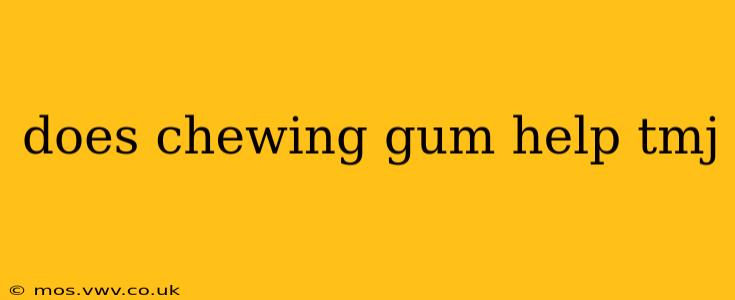Does Chewing Gum Help TMJ? A Comprehensive Look at the Evidence
Temporomandibular joint disorder (TMJ) affects millions, causing jaw pain, headaches, and clicking or popping sounds. Many seek natural remedies, and chewing gum is often suggested. But does chewing gum actually help TMJ, or could it worsen the condition? Let's delve into the complexities of this question.
The short answer is: it's complicated. While some believe chewing gum can alleviate TMJ symptoms, the evidence is inconclusive and often contradictory. The effects depend heavily on several factors, including the type of gum, the intensity and frequency of chewing, and the underlying cause of the TMJ disorder.
How Could Chewing Gum Help TMJ?
Proponents suggest that chewing gum might offer benefits by:
-
Strengthening jaw muscles: Gentle chewing can potentially strengthen the muscles surrounding the temporomandibular joint. This could improve muscle balance and reduce pain caused by muscle weakness or imbalance. However, this is only true with moderate chewing. Excessive chewing can have the opposite effect.
-
Improving joint lubrication: The act of chewing can stimulate the production of synovial fluid, which lubricates the TMJ. This lubrication can reduce friction and alleviate pain associated with joint stiffness or dysfunction. Again, this benefit is contingent on moderate chewing habits.
-
Distraction and Stress Relief: Chewing gum can serve as a distraction technique, helping to alleviate stress that might exacerbate TMJ symptoms. Stress is a known trigger for many TMJ flares.
How Could Chewing Gum Harm TMJ?
Conversely, excessive or improper chewing gum habits can negatively impact your TMJ:
-
Increased Muscle Tension: Aggressive or prolonged chewing can lead to increased muscle tension and strain in the jaw muscles, worsening existing pain and potentially causing new problems.
-
Jaw Joint Strain: Over-chewing puts excessive pressure on the TMJ, potentially leading to inflammation and further damage. This is particularly true if you already have a pre-existing TMJ disorder.
-
Incorrect Jaw Posture: Habitual chewing might encourage poor jaw posture, potentially contributing to TMJ problems.
What Kind of Gum is Best (If Any)?
If you're considering chewing gum for TMJ relief, opt for sugar-free gum. Sugar can contribute to dental problems, which can indirectly impact the TMJ. Avoid gums that are too hard or require excessive chewing force. Look for softer gums and chew gently.
Can Chewing Gum Cause TMJ?
While chewing gum doesn't directly cause TMJ, improper habits can contribute to or exacerbate symptoms. Excessive chewing, clenching, or grinding, whether with gum or not, are all detrimental to the jaw joint.
What Are Other Effective Treatments for TMJ?
It's crucial to remember that chewing gum is not a primary treatment for TMJ. More effective treatments, often recommended by dentists or other healthcare professionals, include:
- Physical Therapy: Exercises to strengthen and relax jaw muscles.
- Pain Management: Over-the-counter pain relievers or prescription medications.
- Nightguards: Custom-fitted mouthguards to prevent nighttime clenching or grinding.
- Lifestyle Changes: Stress management techniques and dietary modifications.
Conclusion:
The relationship between chewing gum and TMJ is complex and not fully understood. While moderate chewing might offer minor benefits for some individuals, it's not a cure and can potentially worsen symptoms if done incorrectly. If you experience TMJ symptoms, consult a healthcare professional for proper diagnosis and treatment. They can guide you on appropriate management strategies, including whether or not chewing gum (and if so, how) might be a suitable option for you. Self-treating TMJ can be risky, so prioritizing professional advice is essential.
